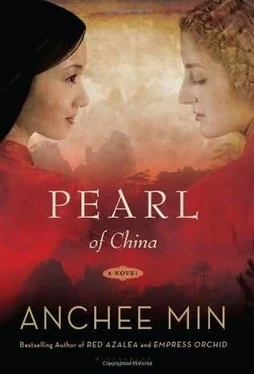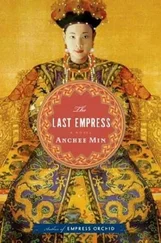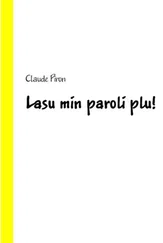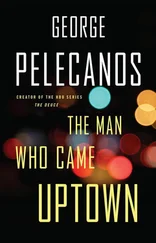“So you are moving to Nanking?”
“What choice do I have?”
“What about your mother?” I asked.
“I’ll see her,” she replied. “Thank God for the railway.”
One day I ventured to ask Pearl if she and Lossing still loved each other.
Tears welled up in her eyes. “For heaven’s sake, I am carrying his child. Even if I don’t need him, the child does.”
Carol Buck was born on March 4, 1920. Although it was a smooth birth, a tumor was discovered in Pearl ’s uterus. The doctor insisted that Pearl go to America to have the tumor removed, which she did. It was a long journey that took four months. As a result of the surgery, Pearl could no longer have children. The news crushed her. She wrote, “I am grateful to have the opportunity to lavish my affection abundantly on Carol.”
Pearl and Carol followed Lossing to Nanking. “We simply abandoned Nanhsuchou,” Pearl reported.
To Pearl’s dismay, Nanking was in the middle of a war. Different Chinese warlords and political factions were fighting for dominance of the city and outlying regions.
“I was shaken when bullets whistled across my garden,” she wrote. “I tried to help the civilian casualties. One woman was shot in the stomach and died in my arms. I felt powerless.”
Carie longed to spend time with her granddaughter. Painstakingly, Pearl made arrangements. She took the train and visited as much as possible. To hold the baby in her arms, Carie struggled to push herself out of the bed. Carol was a milk-skinned, chubby, and beautiful child.
Motherhood brought Pearl profound happiness. The birth of Carol also saved her marriage. She no longer complained about Lossing. Instead she talked about her handsome new home in Nanking with all its lovely trees and a bamboo grove at the far end of the garden.
Pearl applied for a part-time job teaching English at the university’s night school. She was pleased that with only their two small salaries she and Lossing were able to afford servants. “Believe it or not, we have three,” she said. “One takes care of the laundry and the garden, one does the cooking, and one helps me with Carol. It’s hard to believe that I now have extra time on my hands. I have been writing every chance I get and I have just completed a new novel!”
None of us had any sense of the tragedy that was looming. Carol showed no sign that she was a victim of phenylketonuria, but Pearl would soon find out. It was an inherited metabolic disease that would lead Carol to suffer severe mental retardation.
Pearl started to come to Chin-kiang less frequently. By this time, Carol had had her first birthday. When Pearl did come, she didn’t stay long. She had to leave before Carie had had enough time with Carol. Pearl grew tense when watching Carol play. I noticed that although baby Carol looked healthy and was sweet, she didn’t talk when she was supposed to.
Without any warning or word, Pearl stopped coming. After a two-month silence, she came without Carol. She made excuses when her mother questioned. She sat with Carie and tried to look cheerful, but I could tell it was an act.
Carie had her bed moved next to the window, where she could better see the trees and mountains. She was silent most of the time while Pearl held her hand. She said nothing when it was time for Pearl to leave.
Carie stared out into the darkness after Pearl was gone. To cheer her up, I told her about the Chin-kiang Christian Girls’ Choir. “I have been teaching the girls all the songs you taught me,” I reported, “and we have been rehearsing for the Christmas Eve performance.”
Carie enjoyed my news, but deep down she missed her daughter and granddaughter.
Months went by and Pearl didn’t visit. Then I received a letter from her. It broke my heart. Doctors had confirmed her worst nightmare-Carol would never grow up mentally. In her letter, Pearl begged me to keep the news from Carie. “Tell Mother that I will come as soon as I get a chance and I promise that I will stay longer next time.”
Carie sensed that her end was approaching. She called me to her bed. She wanted to visit Kuilin in Guangxi province before she died. “Would you accompany me, Willow?” she asked.
I made arrangements immediately. I wrote to Pearl, who was in America with Lossing getting treatment for Carol, that her mother was determined to make the trip. We arrived in Kuilin by train after five days. Sitting on a chair on a bamboo raft, Carie floated down the Li-jiang River. With tears in her eyes, she gazed over the ink-painting-like landscape. The clear, smooth water mirrored the green mountains against a cloudless sky.
“I am ready to die now,” Carie said quietly.
“No, you cannot,” I responded. “You haven’t heard Carol call you Grandma yet.”
She shook her head slightly. “Carol might never be able to.”
That was when I realized that Carie had known all along what was happening. She had tried to take away Pearl ’s burden by pretending to know nothing. She had seen too much death and illness over the years to be fooled.
“But why aren’t you fighting?” I wept with my cheek against the back of her hand. “You have always been a fighter. You fought for your children, your own fate, and everybody else’s. I remember the way you scrubbed my hair with soap trying to get rid of the lice.”
Carie gave a weak smile. “I am too tired.”
I understood the reason Carie had come to Kuilin. It was her way to help Pearl. If she wasn’t home, Pearl wouldn’t have to rush back to Chin-kiang.
“You have been hard on yourself, Carie,” I said.
“Nothing is hard when I have you by my side.” She smiled.
I asked if there was anything else that I could do for her.
She was silent for a while and then uttered, “Be there for Pearl after I’m gone.”
Carie died the day before Christmas. Pearl and I were with her till the end. Carie’s last wish touched me deeply. All her belongings were to be sold and the funds given to her lifelong maid and friend Wang Ah-ma, so that she could retire and return to her provincial town. The funeral was held on Christmas Day. Absalom performed a simple ceremony, the same ceremony he offered the locals. We were stunned that Absalom didn’t do more for his wife.
The casket was lowered slowly into the ground. Behind Pearl and Absalom, the entire town of Chin-kiang stood. Grief-stricken, Wang Ah-ma fainted. The Chin-kiang Christian Girls’ Choir sang “Amazing Grace.” Playing Carie’s piano, I made a promise to myself to maintain Carie’s grave like a Chinese daughter would.
Hundreds of candles were placed in cut-off gourds filled with sand. Members of the girls’ choir lit the candles and prayed for Carie’s spirit. The candles were then placed on lotus pads and set free to drift with the current. Slowly the candles floated into the canal and then the Yangtze River. We prayed that Carie’s spirit would travel across the Pacific Ocean and reach her birthplace in America.
Absalom was upset when Lilac proposed hosting a “tofu banquet” to honor Carie. It was the Chinese Buddhist tradition. The wish came from people who felt deeply indebted to Carie. Papa reminded Absalom that the majority of the provincial people, whose lives Carie had touched and helped, were not Christians.
Lilac told Absalom, “We would like to send off old spirits and greet new ones so Carie may gain favors in her next life, not only with the Christian God but also the Chinese gods.”
Papa explained to Absalom, “It is an honor only people of high standing and wealth can afford.”
“No!” Absalom frowned with his eyebrows and said firmly. “That is against the Christian principle. An elaborate funeral is wasteful. Carie did nothing more than her Christian duty.”
Читать дальше












